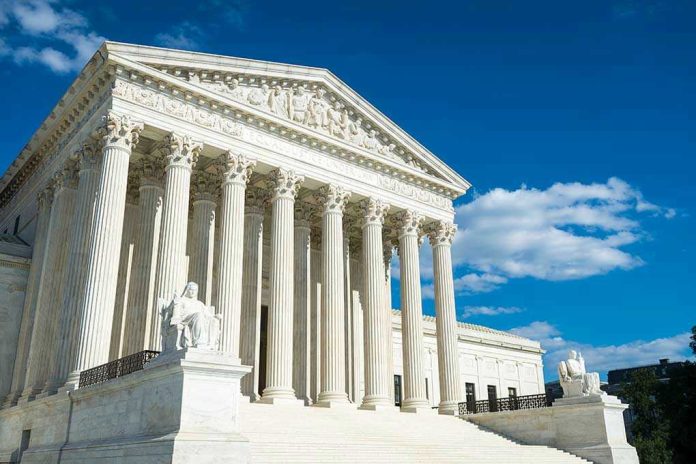
The most powerful man in America just asked the Supreme Court to erase a jury’s verdict that labeled him a sexual abuser—yet the outcome of this legal gamble could reshape how public figures face private allegations for decades to come.
Story Snapshot
- Donald Trump petitions the Supreme Court to overturn a jury’s finding of sexual abuse against E. Jean Carroll.
- The case centers on alleged events from the mid-1990s, raising questions about accountability and the statute of limitations.
- The verdict’s reversal could set new legal benchmarks for defamation and personal liability for presidents.
- This legal move tests the boundaries between political power and judicial independence.
Trump’s Supreme Court Petition: An Unprecedented Challenge
Donald Trump’s legal team filed a petition with the Supreme Court on Monday, seeking to nullify a jury’s verdict that found him liable for sexually abusing writer E. Jean Carroll in the mid-1990s. The move stunned legal observers, as it asks the highest court in the land to wade into a case blending celebrity, politics, and deeply personal allegations. Carroll’s accusation, which surfaced decades after the alleged incident, forced the American public to confront the question of how—and if—powerful men are held accountable for private conduct. Trump’s decision to take the case to the Supreme Court signals a strategic bet: that the country’s most conservative-leaning bench may be sympathetic to arguments about due process, reputational damage, and the limits of retroactive justice.
The jury’s original verdict rested not on criminal guilt but on the civil standard of liability, meaning Trump was not convicted of a crime but was found responsible for harm. This distinction is crucial, both for the president’s legal fate and his political prospects. Trump’s appeal hinges on the assertion that the trial process itself was flawed and that the verdict should not be allowed to stand as a precedent against future presidents or public figures. His legal team’s arguments focus on constitutional questions—whether a sitting or former president can be sued over alleged conduct that occurred before taking office, and whether the jury’s findings were influenced by public sentiment rather than strict legal standards.
Legal Stakes: More Than Just One Verdict
The Supreme Court’s decision to hear—or not hear—Trump’s appeal carries weight far beyond the courtroom. If the justices agree to review the case and ultimately side with Trump, they could establish new legal boundaries for how allegations against high-profile individuals are adjudicated. Such a ruling might narrow the circumstances under which decades-old claims can be revived, especially when the accused holds or held public office. Legal scholars suggest this could chill future civil suits against powerful figures, giving them broader immunity from reputational attacks rooted in personal behavior.
On the other hand, if the Supreme Court declines to intervene or upholds the jury’s decision, the message is equally clear: political status does not grant protection from the consequences of private misconduct. This outcome would reinforce the principle that no one, not even a president, is above the law when accused in a civil court. The case also spotlights the tension between the judicial process and the court of public opinion. Trump’s supporters view the suit as a politically motivated attack, while his critics see it as a long-overdue reckoning for alleged abuses of power. The Supreme Court’s handling of the case will inevitably be interpreted through a political lens, regardless of the legal reasoning in its eventual decision.
Political Reverberations and the Court’s Legacy
Trump’s Supreme Court petition lands at a moment of deep polarization, with Americans divided not only over the president’s conduct but over the very legitimacy of the courts. If the justices agree to hear the case, they risk fueling accusations that the judiciary is driven by partisan interests. Yet declining to review the verdict could be seen as an abdication of responsibility—especially if Trump’s legal team succeeds in framing the issue as a fundamental test of constitutional rights.
For Trump, the stakes are both personal and political. A Supreme Court win would bolster his narrative of victimhood and persecution, energizing his base ahead of future elections. A loss would cement the jury’s finding in the public record, potentially complicating his quest for political redemption. Observers on both sides of the aisle recognize that the case is not just about E. Jean Carroll or Donald Trump—it is about the evolving standards of accountability for America’s most powerful citizens. The Supreme Court’s decision, whatever it may be, will echo through the nation’s legal and political landscape for years to come.
Sources:
Trump asks Supreme Court to throw out E. Jean Carroll sexual abuse verdict

